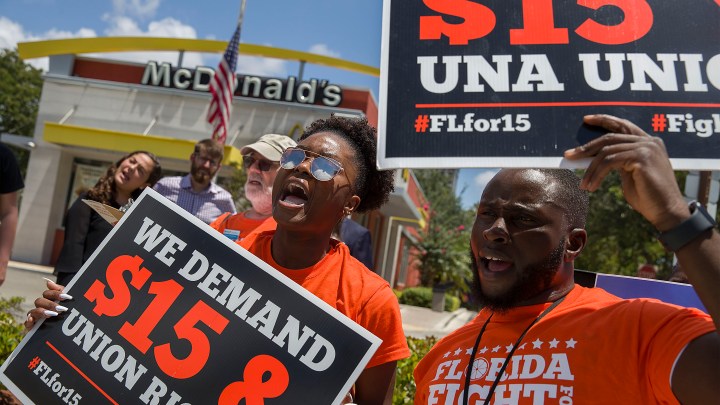
NLRB rule could make it harder for millions of workers to organize
NLRB rule could make it harder for millions of workers to organize

The National Labor Relations Board, which oversees federal labor law disputes, is about to make it harder for workers at certain types of businesses to unionize. The board is rolling back an Obama-era doctrine that held some corporations accountable for violations of federal labor law by subcontractors or franchisees.
As an example of how the rule change will play out, consider McDonald’s: It’s one of the biggest private employers in the world, but 95% of its U.S. locations are franchises.
“Let’s suppose that a worker is trying to organize at a restaurant and they get fired, which is against the law,” said Alex Colvin, dean of the Cornell School of Industrial and Labor Relations, noting workers have a right to organize under federal labor law.
The worker could sue the employer for retaliation, Colvin said, but who the employer is in such situations has changed.
“The individual restaurant owner could be responsible, but McDonald’s would not be,” said Colvin, even though McDonald’s corporation influences many working conditions at its restaurants and could simply close any store that votes to unionize.
The implications go far beyond just fast food chains, said David Weil, dean of the Heller School for Social Policy and Management at Brandeis University and author of “The Fissured Workplace.” He said across the economy, business is getting more complicated.
“There are a lot of hands in employment,” he said. “It’s not simply one employer and one worker.”
From technology companies to hotel chains, businesses are increasingly relying on subcontractors and franchisees. That could leave millions of workers with less power to organize when the rule takes effect in April.
There’s a lot happening in the world. Through it all, Marketplace is here for you.
You rely on Marketplace to break down the world’s events and tell you how it affects you in a fact-based, approachable way. We rely on your financial support to keep making that possible.
Your donation today powers the independent journalism that you rely on. For just $5/month, you can help sustain Marketplace so we can keep reporting on the things that matter to you.












